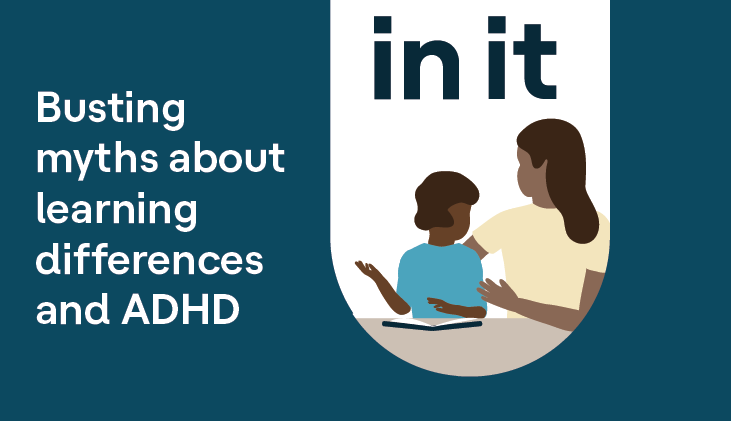Stay in the know
All our latest podcasts delivered right to your inbox.
There are plenty of myths and misconceptions about learning differences. Is ADHD just about hyperactivity? Is dyslexia a vision problem? And do kids outgrow learning differences?
In this episode, host Gretchen Vierstra shares common myths about learning and thinking differences for co-host Amanda Morin to bust. Listen to Amanda debunk these myths with the facts. Learn why these myths persist and how you can help fight against them. Plus, hear the misconceptions that Amanda, Gretchen, and their producer believed before they learned the truth about learning differences.
Related resources
Episode transcript
Amanda: From the Understood Podcast Network, this is "In It." On this podcast, we offer perspectives, stories, and advice for and from people who have challenges with reading, math, focus, and other types of learning differences. We talk to parents, caregivers, teachers, experts, and sometimes even kids. I'm Amanda Morin. I'm the director of thought leadership for Understood. And I'm a parent to kids who learn differently.
Gretchen: And I'm Gretchen Vierstra, a former classroom teacher and an editor here at Understood. And today, we want to do some myth busting. There's lots of misconceptions out there about learning and thinking differences.
Amanda: And it's totally understandable that there are misconceptions, because a lot of what we've learned over the years about these differences is complicated. It's counterintuitive, and we are still learning, too.
Gretchen: Exactly. I don't know about you, Amanda, but I can still remember some of the ideas I had way back when, when I started teaching at a mere 23 years old, that I now know were totally not true.
Amanda: Me, too, Gretchen. I think I started teaching when I was 21, and I don't know about you. Do you have, like, examples that stick in your mind of your misconceptions?
Gretchen: Yes, totally. You know, as a general education teacher, one of the things I thought I knew about ADHD was that I would be looking for kids and probably mostly boys who were hyperactive. I wasn't thinking about the fact that it could be a student who was quietly not able to focus, right? Couldn't finish the book, perhaps couldn't get through a whole test. I really wasn't thinking about that. I only thought about hyperactivity.
Amanda: I think me too. And I wonder how much of that is about when we started teaching and how much of that is about just sort of that expectation that, you know, you see it, you see ADHD in that — that it's like the boys who are running around and bouncing off the walls and jumping off the top of the playground and all of those kinds of things. But we now know that's not true. ADHD, the "H" is hyperactive, but there's also attention deficit in that, right? So that inattention matters as well. There are kids in classrooms, there are kids all over who maybe don't show those hyperactive or impulsivity kinds of things. That's a common one, right?
Gretchen: It is. And also, what about the fact that I, going into teaching, thought it would mostly be boys and that the boys would definitely be the hyper ones? I mean, I will admit that is what I thought. And I know that's not true.
Amanda: Yeah. And I think, like, I can take that as an early intervention specialist, we often saw boys first, you know, because boys tend to have hyperactive-type ADHD a little bit more often than girls. And that's the first thing people notice. But the truth of the matter is inattentive-type ADHD, that distraction, that daydreaming, that kind of thing, it's also really common. And it's not just girls who have that. So you see it in girls and boys, but it's not the kind of thing, like in a classroom, it's not the kind of thing that like jumps out at you. Because when you're trying to manage all of these kids, the things that are like literally popping up are the things that you're paying attention to more.
Gretchen: That's right. What about you, Amanda? Is there any particular idea you had about learning differences that tripped you up as a teacher or maybe as a parent?
Amanda: Oh, my gosh. Yes. So as our listeners know, I have kids who have learning differences, too. When I first started this with my own kids, you'd think because I had experience in the classroom that I'd notice it and I'd not have these myths. But I remember thinking with one of my children. I remember thinking like, "Why doesn't he just try harder? He can do all of these amazing things." And it's like what teachers would say to me: "He's just not trying hard enough."
I didn't do a real good job at first of pushing back on that and saying, you know, this stuff he needs to learn and has trouble with. I think I may have accepted it more than I should have. And I — that's a whole other thing. But as a teacher — gosh, you know, you have that one kid you remember, you know? I remember from maybe my fifth year of teaching, right? So more years ago than I'm willing to say. But I will say that this child is now probably has her own family, let's just say, right? Had a really hard time learning how to read and do letter sounds and stuff like that, but was also kind of like balky about it. Wouldn't do it and was sort of tuned out a lot of the time. And and I kind of chalked it up to she was being stubborn. And as I look back at it, I realize like she was telling me with her behavior that she was having trouble. And I think that now I would definitely have a conversation with that child's parents and say, "I think we're seeing some signs of reading issues. I think we're seeing some signs of inattentive, maybe ADHD, maybe...." You know, I wish I'd had that conversation and like, I still think about that. And I wonder, you know, how is she doing? What did her rest of her school career look like?
Gretchen: I know. It's hard not to focus and blame ourselves for things that we may have missed. The word "blame," though, right? Also reminds me of something else that I think comes up, which is hearing people blame parents for their kids' behaviors. Actually, not just behaviors, but the learning differences themselves. I've heard things like, "Hmm, maybe you just didn't read enough to your child," for a student who has dyslexia. Or "Hmm, are you setting boundaries? Maybe that's why your child has ADHD." I've even heard things about like, "Maybe you're feeding your kids too much sugar." These are all myths, right? This blame that we're placing? These are all myths, aren't they?
Amanda: They totally are. And the sugar one, I don't know how many times I've heard that. You know, "If you change his diet a little bit, you know, he'd be calmer." And I kind of have this like maybe if I change his diet, I'd be calmer, but I don't know if he would be calm, right? But I think you're right. Like, I think a lot of times people are looking for a place to put blame and they don't do it deliberately. I think they do it weirdly. They're trying to be helpful. They're trying to say, like, well, if you just tried this, probably it would get better. But what it comes out to, like parents like me, what it is, is like you're not doing it right. And that's really hard. I am going to do the thing where I put our producer Julie on the spot and ask her to chime in. Because Julie, you've worked with us for a few years now, and I'm wondering, what didn't you understand at first or maybe still don't understand about learning differences?
Julie: Yeah, I think there's a lot of things that I didn't understand and that I'm still learning. I'm a little embarrassed to tell you this one, but it is true that a lot of times when people ask me when I'm working on it, I'm telling them about this podcast, I'll say it's, you know, for families who have kids with learning and thinking differences. And then I say, like, you know, ADHD or dyslexia, and then I sort of trail off.
Gretchen: You mumble and....
Julie: I feel like I know there are others and some of them we have actually done episodes on. But I wonder, can you spell out for me, what do we mean when we say learning and thinking differences?
Amanda: I can do that. OK. So at Understood in particular, we have sort of what we call core issues, right? Issues that we specifically focus on. And the word "learning differences" encompasses a lot of things. But when we talk about some of our core issues, they're actually learning disabilities. And so dyslexia is a language-based learning disability. So that's one of them. There's written expression disorder, which is sometimes known as dysgraphia as well, another learning disability. And then dys-cal-cu-luh — or dyscalculia or however people say it — is a third learning disability that we also focus on. And then we also focus on ADHD, which is not a learning disability, but it can get in the way of learning. And that's another myth. A lot of people think ADHD itself is a learning disability. And then the last thing that we focus on as a core issue and Understood is language disorder. So receptive language, the ability to make sense of what other people are saying to you. And expressive language disorder is the ability to take your thoughts and put them out verbally and have other people understand you. There are other differences. Those are just the ones that we particularly focus on. So now you can go answer that question differently or have people listen to this podcast.
Julie: Exactly.
Gretchen: No more trailing off.
All right, so we've just learned a lot and we're ready to learn more. Because there are actually quite a few misconceptions that we've come across. And I'm so happy that Amanda is here to help us sort through some more of them. So, Amanda, are you ready to tackle another one?
Amanda: Indeed.
Gretchen: So here's one we hear a lot. It's the belief that a child who is diagnosed with a learning disability will grow out of it. Does that actually happen?
Amanda: Oh, that's a really common one, right? It doesn't happen. If you have a learning disability, you have a learning disability because your brain is just processing information differently. What may happen is kids, as they grow older, have more strategies. So they've learned how to accommodate for themselves. So it looks like they maybe they've outgrown some of the things you saw when they were younger. But it's not that they're outgrowing a learning disability. I think that does a disservice to all of the adults out there who have learning disabilities. Because at 18, you're not like, oh, no learning disability anymore. It may change what it looks like and how it shows up, but it's not that it doesn't exist anymore.
Gretchen: And what about ADHD, though? I've heard different things about this.
Amanda: There is a very small percentage of people, and this is not my expertise, so I want to be really cautious in saying. There's a very small percentage of people who do sort of outgrow the symptomology of ADHD, but it's a very small percentage.
Gretchen: All right. Well, here's another one. And I think this is something I held on to for a while when I was a kid. When I first heard about dyslexia, I thought dyslexia was either a vision problem or I thought it was just seeing letters backward and that's it. But we know that's not the case, so please explain, Amanda.
Amanda: I think we think that because you see it a lot like in TV and stuff like that, when somebody has dyslexia, you see like the words are swimming on the page or in front of them or that kind of a thing. It's not. I think we're just going to say that. It's not just that. It's not a vision problem. You know, people with dyslexia may have vision problems, but I'm sitting here with my glasses on. I also have vision problems and no dyslexia. I think one of the best things I heard is somebody that we work with who has dyslexia. She said to me, "It's not that I can't read, it's that I had trouble learning how to read, right? I had trouble with the sounds and putting the sounds together in the language." So that was really helpful to me to realize what dyslexia is, is more about that language learning and the being able to decode the sounds and being able to get the vocabulary and get all of that put together. And people who have dyslexia may often have difficulty with sort of their spoken language as well, like retrieving language when they're talking. So that's why it's called a language-based learning disability.
Gretchen: Got it. All right. Well, here's another point of confusion, I think, that has to do with kids who are what we call twice exceptional, or 2e. Can you explain what 2e means and how does it throw people off?
Amanda: I'll do a quick one and then I will also put a plug in for the fact that we did an episode on twice exceptionality that people can go back to and listen more about. 2e or twice exceptional means that you have a child or adult who is intellectually gifted and also has a disability. It doesn't have to be a learning disability, and I think that's important to note, too. But when we talk about it, we're often talking about kids who have learning disabilities and are also intellectually gifted. And what throws people off there is this myth that, like, you know what, you can't be gifted and also have a learning disability. And it's just not true. One of the things that I think people — and I probably held this misconception as a teacher when I first started, too — is that it sort of cancels each other out, right? But you can have a learning disability and also be in like AP classes. And you can have accommodations in all of those gifted classes. And we all have things that are difficult for us and are not difficult for us. So I think it's just a magnitude thing to think about it that way, too.
Gretchen: That's a good way to explain it. All right. Here's the one that people have trouble pronouncing: dys-cal-cu-li-a or dys-cal-cu-luh? I know, I think I say dyscalculia. In any case, this is often described as just math dyslexia. But that's not really how we should be describing it, is it?
Amanda: No, no. I've heard people say it's also just like significant math anxiety, which it is also not. Again, I'm going to go back to the brain part of this. It's the way your brain is wired and the way it processes information around math. I actually like the word "dyscalculia" because I can remember it sounds like calculator, so it makes me remember that it's math, right?
But you know, it impacts sort of the ability to learn numeracy, which is kind of a fancy way of saying like all of those underlying concepts about numbers — you know, counting, one-to-one correspondence, knowing that a numeral matches a group of numbers, knowing patterns and shapes, estimating, proportionality, all of those kinds of things that are math concepts that we actually use in everyday life. So it's not just about being anxious about math. It's about those everyday skills. You know, people may also have trouble with, like, calculating the tip, you know?
Gretchen: Yeah. I never thought how helpful those tip calculators on the end of a receipt. I always thought they were just trying to push me to give more money. But really, maybe it's an accommodation. I should think about it that way.
So speaking of accommodations and things like calculators, a lot of people have confusion around this. They see some of the tools that some people might use as accommodations as cheating. So, for example, I'm thinking of assistive technology, things like dictation apps, or audiobooks, or even the calculator. Are those things cheating? Are we stopping people from learning or doing things in the way that they should? I'm using air quotes right now. Or are those things just accommodations? What's the what's the deal here, Amanda?
Amanda: It's not cheating. Like, I'm just going to say that flat out. It's not cheating. I've heard that, you know, with kids with a written expression disorder, people say, like, my kid refuses to write, and I think they just want to use the computer. Or, you know, this kid will only read comic books and that's not really reading. And like, those things just aren't actually true, right? These adaptations, these accommodations are actually helping us learn. And what's really interesting is that everybody uses accommodations in their daily life, right? The example I often talk about is way back when, when you used to go to crowded restaurants or whatever, right? And there was a lot of noise going on, and if there was a game on the TV or whatever, oftentimes you have the closed captions on because you can't hear over the crowds, right? My Mr. 12 — we talk about Mr. 12 sometimes, right? He uses closed captions all the time on the TV, not because he needs the closed captions, but because it helps him process the language. He uses the closed captions as an accommodation. But you know what? It helps everybody. Those kinds of things help everybody.
Gretchen: Yeah, exactly. And as a former English teacher who filled my classroom with books, I would like to just point out that graphic novels, comics, magazines, all those things counted as reading is my classroom.
Amanda: Reading is reading.
Gretchen: Reading is reading. Exactly.
Amanda: Well, and I would add to that audiobooks, right?
Gretchen: Yes. Audiobooks, too. Exactly. Yep. All right. I think one last thing here. A pet peeve, Amanda, that we were talking about just the other day. We were saying how we are not fans of hearing things like, "Oh, I'm so ADHD today," or "You'll have to excuse me, I'm a little OCD." Explain. Why don't we like that so much?
Amanda: Gretchen is watching my face do a whole thing right now. I actually have OCD, so that one is very personal to me. It's just like I get frustrated when people use it as a shorthand for explaining what they're having trouble with, right? I have OCD, and I will always have OCD. And so I don't get to put it to the side. "I'm OCD today and I'm not OCD tomorrow and I'm not," you know, like — and so when people use those phrases like, "Oh, I just, you know, I'm so ADHD today" or, you know, "I'm a little OCD," it feels like it sort of diminishes the experience that people have on a daily basis. You know, you don't get to put it away. You don't get to have days when you're not ADHD. It doesn't acknowledge that there are people that this is their whole experience all the time.
Gretchen: Yeah, exactly. All right. I think we've covered a lot. Is there anything else, Amanda, that you think we should address?
Amanda: I think maybe just that these are just a few of the myths that are right there, right? There are tons of myths and misconceptions which are — that's very hard to say. So the more we bust them, the less we have to say "myths and misconceptions." So just, you know, take a moment to think through. And if you don't know, ask. And if you don't have someone to ask....
Gretchen: Write in or ask us.
Amanda: Right? I know!
Gretchen: Write in or ask us, or go to Understood.org, where we have a ton of articles on many of these myths. We've got articles that are called like "7 Myths About ADHD," for example. I don't know if it's seven, but you know what I mean. We've got lists. And so if you go to a Understood.org, you can find some of these lists and they can explain things. And, you know, if you have someone in your family who maybe is questioning some of the things that perhaps like your child is is learning, they have a diagnosis and a family member saying "that's not true" or "that's not real," send them these facts. We've got fact sheets and we've got myth-busting sheets. And you can send those along to people to help, you know, better educate them and give them the tools so that they can talk about it.
Amanda: Send the tools. And I think that what that does is take some pressure off you for having to be the one who feels like you're always educating other people. And we will put links to — I wouldn't — probably not all of them, because we have so many of them. But we'll put links to a lot of them along with other resources in our show notes for this episode, so that you out there can start educating other people and be a myth buster on your own.
Gretchen: That's right.
Amanda: You've been listening to "In It" from the Understood Podcast Network.
Gretchen: This show is for you. So we want to make sure you're getting what you need. Email us at init@understood.org to share your thoughts. We love hearing from you.
Amanda: And if you liked today's episode, please share it with the folks around you — other parents, your child's teacher, or other people who may want to know more about learning differences and debunk some myths of their own.
Gretchen: Understood is a nonprofit organization dedicated to helping people who learn and think differently discover their potential and thrive. Learn more at understood.org/mission.
Amanda: "In It" is produced by Julie Subrin. Briana Berry is our production director. Andrew Lee is our editorial lead. Justin D. Wright mixes the show, and Mike Errico wrote our theme music. For the Understood Podcast Network, Laura Key is our editorial director. Scott Cocchiere is our creative director. And Seth Melnick is our executive producer.
Gretchen: Thanks for listening and for always being in it with us.
Hosts

Gretchen Vierstra, MA
is the managing editor at Understood and co-host of the “In It” podcast. She’s a former educator with experience teaching and designing programs in schools, organizations, and online learning spaces.
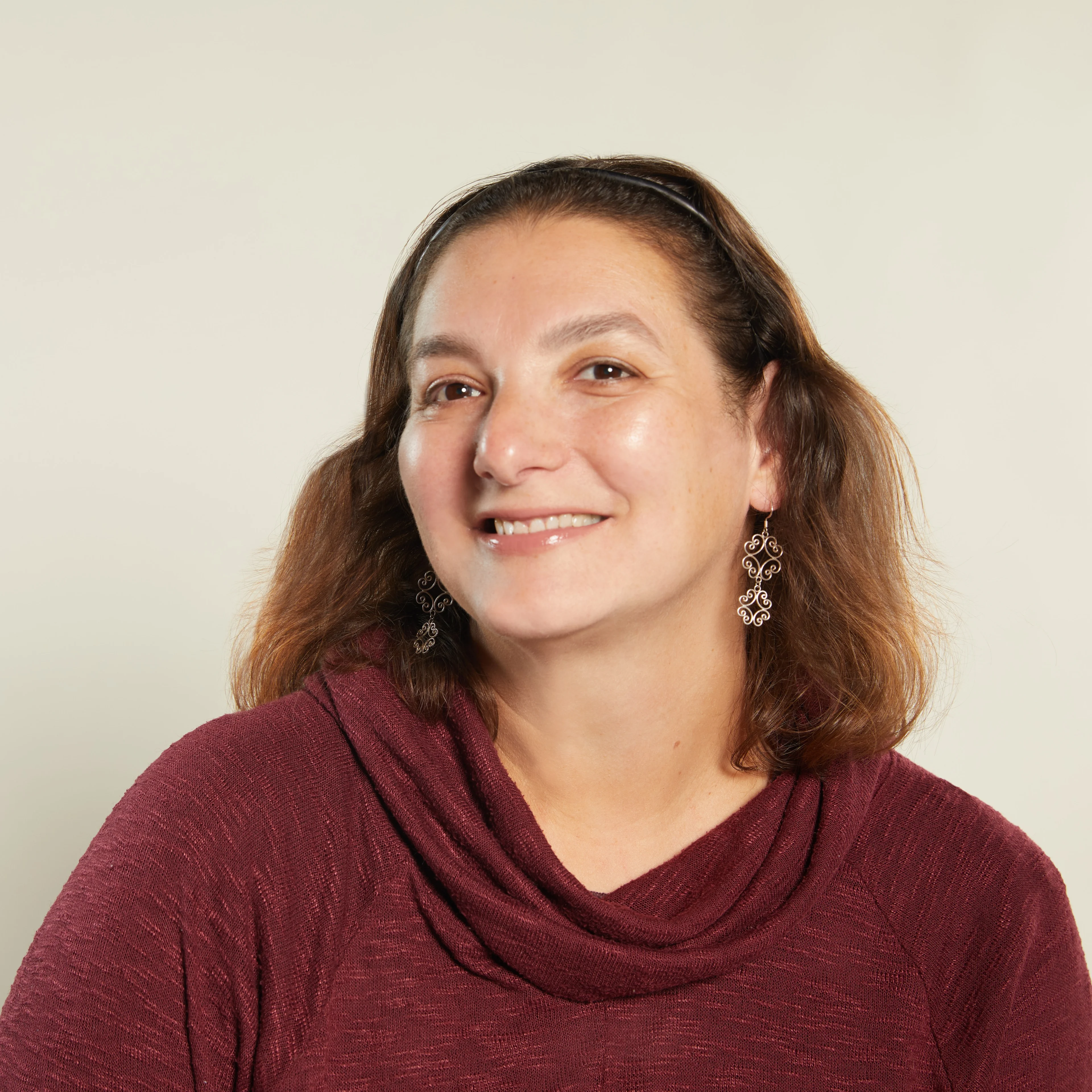
Rachel Bozek
is co-host of the “In It” podcast and the parent of two kids with ADHD. She has a background in writing and editing content for kids and parents.
Latest episodes
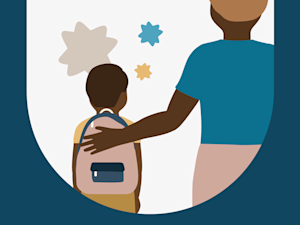
April 11, 2024
Learn ways to advocate for your child at school while maintaining a good relationship with their teachers.
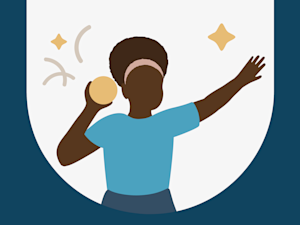
March 28, 2024
The track and field gold medalist shares her story and talks about ADHD, dyslexia, and building confidence.
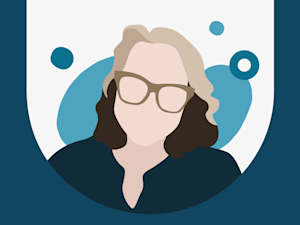
March 14, 2024
The hosts interview kids’ book author Lindsey Rowe Parker. She talks about her new picture book about sensory differences in kids.
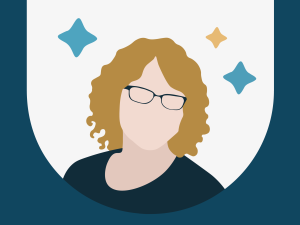
February 29, 2024
Understanding what a language disorder means for your child can be overwhelming. Here’s help from an expert.
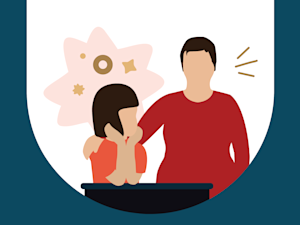
February 15, 2024
Talking with your child about their diagnosis of a learning and thinking difference can be tough. Get advice from an expert.
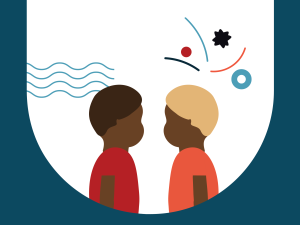
February 1, 2024
How can you manage the challenges of having one child who learns and thinks differently and one child who doesn’t? Get advice from an expert.
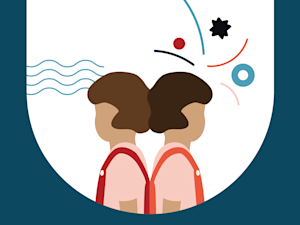
January 18, 2024
Any sibling relationship can be hard to manage. But what happens when one of the siblings has a learning or thinking difference? Here’s one mom’s story.
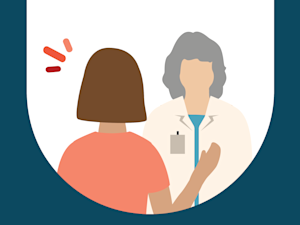
January 4, 2024
Overwhelmed by talking with your child’s pediatrician about ADHD or learning differences? These tips can help.
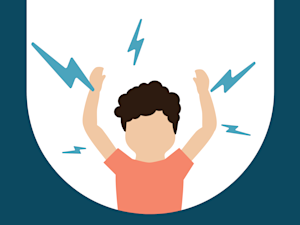
December 14, 2023
Tantrums and meltdowns are challenges all parents face. Get tips for projecting calm when kids and teens have tantrums.

November 30, 2023
A child’s learning or thinking difference can take any parent by surprise. One mom shares how her daughter’s diagnosis changed her parenting.
